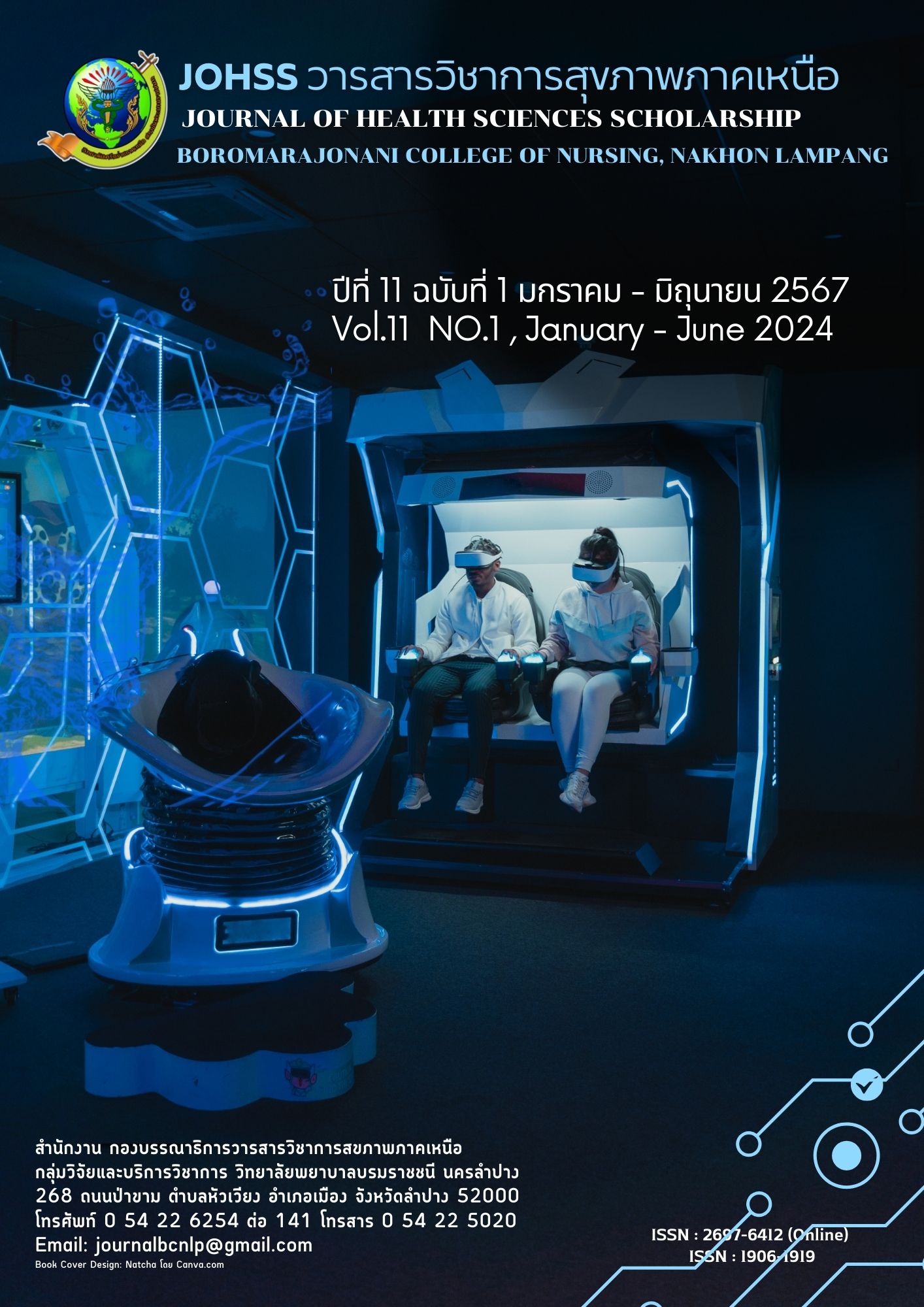ผลของโปรแกรมการบำบัดแบบบูรณาการต่อการป้องกันการกลับไปเสพซ้ำในผู้ที่เสพแอมเฟตามีน
คำสำคัญ:
ผู้เสพแอมเฟตามีน, การป้องกันการกลับไปเสพซ้ำ, โปรแกรมการบำบัดแบบบูรณาบทคัดย่อ
การวิจัยกึ่งทดลองนี้มีวัตถุประสงค์เพื่อศึกษาผลของโปรแกรมการบำบัดแบบบูรณาการต่อการป้องกันการกลับไปเสพซ้ำ ในผู้ที่เสพแอมเฟตามีน กลุ่มตัวอย่างคือผู้เสพแอมเฟตามีน ที่เข้ารับการบำบัดแบบผู้ป่วยนอกในโรงพยาบาลสันทราย ช่วงเดือนตุลาคม-พฤศจิกายน 2566 โดยการคัดเลือกแบบเฉพาะเจาะจง (Purposive Sampling) ตามคุณสมบัติตามเกณฑ์ที่งานวิจัยกำหนดและผ่านการประเมินภาวะพุทธิปัญญา (Montreal Cognitive Assessment [MoCA]) มีคะแนนมากกว่าหรือเท่ากับ 25 คะแนนขึ้นไป จำนวน 12 คน กลุ่มตัวอย่างได้รับโปรแกรมการบำบัดแบบบูรณาการฯ 3 ครั้งต่อสัปดาห์ เป็นเวลา 3 สัปดาห์ และประเมินโดยใช้แบบสอบถามความตั้งใจในการป้องกันการกลับไปเสพซ้ำและแบบสอบถามพฤติกรรมป้องกันยาเสพติด ซึ่งได้ค่าความเชื่อมั่นเท่ากับ .95 และ .76 ตามลำดับ วิเคราะห์ข้อมูลโดยใช้สถิติเชิงบรรยาย เปรียบเทียบความแตกต่างระหว่างข้อมูลที่วัดซ้ำด้วยสถิติ Friedman test และเปรียบเทียบระหว่างคู่โดยใช้สถิติ Wilcoxon Signed Rank Test
ผลการวิจัยพบว่า กลุ่มตัวอย่างที่เข้าร่วมโปรแกรมการบำบัดแบบบูรณาการฯ มีคะแนนเฉลี่ยความตั้งใจในการป้องกันการกลับไปเสพซ้ำและพฤติกรรมป้องกันยาเสพติดในระยะก่อนทดลอง หลังการทดลองเสร็จสิ้นทันทีระยะติดตามผล 2 สัปดาห์ และ 4 สัปดาห์ แตกต่างกันอย่างมีนัยสำคัญทางสถิติที่ระดับ .05 และระยะหลังการทดลองเสร็จสิ้นทันทีกับระยะติดตามผล 2 สัปดาห์ และ 4 สัปดาห์ ไม่แตกต่างกันอย่างมีนัยสำคัญทางสถิติ
ผลการวิจัยแสดงให้เห็นว่า โปรแกรมการบำบัดแบบบูรณาการช่วยเพิ่มความตั้งใจในการป้องกันการกลับไปเสพซ้ำของผู้เสพติดสารแอมเฟตามีนและช่วยให้มีพฤติกรรมป้องกันยาเสพติดที่ดีขึ้นด้วย ดังนั้น บุคลากรที่เกี่ยวข้องในการให้การดูแลและให้การบำบัดแก่ผู้รับบริการกลุ่มนี้สามารถนำโปรแกรมไปประยุกต์ใช้เพื่อการบำบัดสำหรับผู้เสพแอมเฟตามีนหรือสารเสพติดอื่นๆ
เอกสารอ้างอิง
American Psychiatric Association. (2013). Diagnostic and Statistical Manual of Mental Disorders (5th ed.). ashington, DC: American Psychiatric Press.
Beck, J. S. (1995). Cognitive Therapy: Basics and Beyond (2nd ed.). New York: The Guilford Press.Centre for Addiction Studies. (2022). Substance Abuse Situation in Thailand 2019-2022. Retrieved August 8, 2023, from https://cads.in.th/cads/content?id=4 (in Thai).
Chainakin, C., Prachapiphat, C., & Pumprawai, A. (2016). Cessation of Repeated Amphetamine Addiction: A Case Study of Rehabilitated Persons in Behavior Modification Camp by the Therapeutic Community Method. Kuakarun Journal of Nursing, 23(2), 248-262. (in Thai).
Chokrung, P., Hengudomsub, P., Vatanasin, D., & Pratumsri, W. (2016). The Effect of the Program to Enhance Perceived Drug Abstinence Self-efficacy on Intention to Drug Abstinence Persons with Amphetamine Dependence. Journal of Boromarajonani College of Nursing, Bangkok, 32(3), 37-50. (in Thai).
Chusantia, V., & Pinitsunthon, S. (2017). Effects of substance abuse on people undergoing treatment in Thanyarak Hospital Udon Thani: Case study. Journal of Community Health Development, Khon Kaen University, 5(3), 523-533. (in Thai).
Dallas, J. C., Kaewmat, N., Decchaiyot, P., Paowiriya, H., Bunprachum, C., & Nanta, N. (2017). The Effectiveness of Motivational Enhancement Group Therapy Program on Optimism and Intention to Drug Abstinence among Youth with Amphetamine Abuse. Faculty of Nursing Burapha University.
De Crescenzo, F., Ciabattini, M., D’Alò, G. L., De Giorgi, R., Del Giovane, C., Cassar, C., & et al. (2018). Comparative efficacy and acceptability of psychosocial interventions for Individual with cocaine and amphetamine addiction: A systematic review and network meta-analysis. PLOS Medicine, 15(12), 1-24.
Division of Public Health Administration. (2020). Annual Standard Operation Procedures (SOPs) Budget 2020. Samut Sakhon: Bourne II B Publishing Ltd.
D’Zurilla, T. J., & Nezu, A. M. (2010). Problem-solving therapy. In Dobson, K. S. (Ed.), Handbook of Cognitiveehavioral Therapies (3rd ed.). New York: The Guilford Press.Hemrungrojn, S. (2021). MoCA-thai 8.3. Retrieved July 19, 2023, from http://www.mocatest.org (in Thai).
Klansuwan, A., Takviriyanun, N., & Jirapramukpitak, T. (2021). The Effect of a Motivational Interviewing Together with the Cognitive Behavioral Therapy Program on the Adherence Behaviors of Amphetamine Dependent Patients in a Treatment Center in Pathum Thani Province. Journal of the Department of Medical Services, 43(1), 90-95. (in Thai).
Miller, W. R., & Rolldick, S. (1995). Motivational Interviewing: What is MI? Behavior and Cognitive Psychotherapy, 23, 323-334. Retrieved July 8, 2023, from http://www.motivationalinterview.org2clinical/whatismi.html Miller, W. R. (1995). Motivational Interviewing/Motivational Enhancement Therapy. Retrieved July 11, 2023, from http://casaa.unm.edu/projects/minet
Nilaban, S., Sriherun, B., & Kongthong, U. (2016). Causal Relationship of Factors affect Relapsing Behavior of Methamphetamine Users. Journal of Graduate Studies Valaya Alongkorn Rajabhat University, 10(1), 193-206. (in Thai).
Polit, D. F., & Hungler, B. P. (1999). Nursing Research: Principles and Methods (6th ed.). New York: Lippincott.
Princess Mother National Institute on Drug Abuse Treatment. (2021). Statistical data amount and percentage of total drug cases, fiscal year 2017-2020. Retrieved July 2, 2023, from http://www.thanyarak.go.th
Princess Mother National Institute on Drug Abuse Treatment & Thanyarak Region Hospital. (2021). Matrix Program: Basic Knowledge. Chulalongkorn University Press.
Prochaska, J. O., & DiClemente, C. C. (1982). Transtheoretical theory: Toward a more integrative model of change. Psychotherapy: Theory, Research, and Practice, 19(3), 390-395.
Purahong, G. (2018). Factors Affecting Relapsing Drug-Addicted Patients in Pathumthani Province. Journal of Public Health Nursing, 32(2), 23-40. (in Thai).
Shinaket, S. (2010). Factors affecting drug prevention behavior of vocational certificate students affiliated with vocational education Ratchaburi Province. Master of Education Degree Thesis, Department of Educational Foundations, Graduate School, Silpakorn University. (in Thai).
Saengduenchai, S. (2010). Effects of cognitive-behavioral therapy programs combined with social support It has an impact on the readiness to prevent re-addiction and non-addiction behavior of alcohol patients. Thesis degree Ph.D., Applied Behavioral Science Research, Research Institute of Behavioral Sciences, Srinakharindrawirot University. (in Thai).
Sirinual, S., Supunnakul, P., Noosorn, N., & Wongsawad, P. (2016). Factors affecting amphetamine relapse among drug addicts after treatment. Journal of Health Science Research, 10(1), 39-45. (in Thai).
Thungpankham, P. (2008). Quality of life in people with schizophrenia: perspectives of patients and caregivers. Faculty of Nursing, Chiang Mai University. Retrieved July 2, 2023, from https://cmudc.library.cmu.ac.th/frontend/Info/item/dc:33010
Uten, K., Ratsamesuwiwat, J., Yasin, W., Kumlue, W., & Srisuwan, P. (2020). The Development of Integrative Program on Relapse Prevention among Persons with Amphetamine-induced Psychotic Disorder. The Journal of Psychiatric Nursing and Mental Health, 36(3), 46-70. (in Thai).
ดาวน์โหลด
เผยแพร่แล้ว
ฉบับ
ประเภทบทความ
สัญญาอนุญาต
ลิขสิทธิ์ (c) 2024 วิทยาลัยพยาบาลบรมราชชนนี นครลำปาง

อนุญาตภายใต้เงื่อนไข Creative Commons Attribution-NonCommercial-NoDerivatives 4.0 International License.
บทความ ข้อมูล เนื้อหา รูปภาพ ฯลฯ ที่ได้รับการตีพิมพ์ในวารสารวารสารวิชาการสุขภาพภาคเหนือ ถือเป็นลิขสิทธิ์ของวารสารวารสารวิชาการสุขภาพภาคเหนือ หากบุคคลหรือหน่วยงานใดต้องการนำทั้งหมดหรือส่วนหนึ่งส่วนใดไปเผยแพร่ต่อหรือเพื่อกระทำการใดๆ จะต้องได้รับอนุญาตเป็นลายลักอักษรจากวารสารวารสารวิชาการสุขภาพภาคเหนือก่อนเท่านั้น
เนื้อหาและข้อมูลในบทความที่ลงตีพิมพ์ในวารสารวิชาการสุขภาพภาคเหนือถือเป็นข้อคิดเห็นและความรับผิดชอบของผู้เขียนบทความโดยตรงซึ่งกองบรรณาธิการวารสาร ไม่จำเป็นต้องเห็นด้วย หรือร่วมรับผิดชอบใดๆ
อนึ่ง ข้อความและข้อคิดเห็นต่างๆ เป็นของผู้เขียนบทความนั้นๆ ไม่ถือเป็นความเห็นของวารสารฯ และวารสารฯ ไม่จำเป็นต้องเห็นด้วยกับข้อความและข้อคิดเห็นใดๆ ของผู้เขียน วารสารฯ ขอสงวนสิทธิ์ในการพิจารณาตีพิมพ์ตามความเหมาะสม รวมทั้งการตรวจทานแก้ไขหรือขัดเกลาภาษาให้ถูกต้องตามเกณฑ์ที่กำหนด



